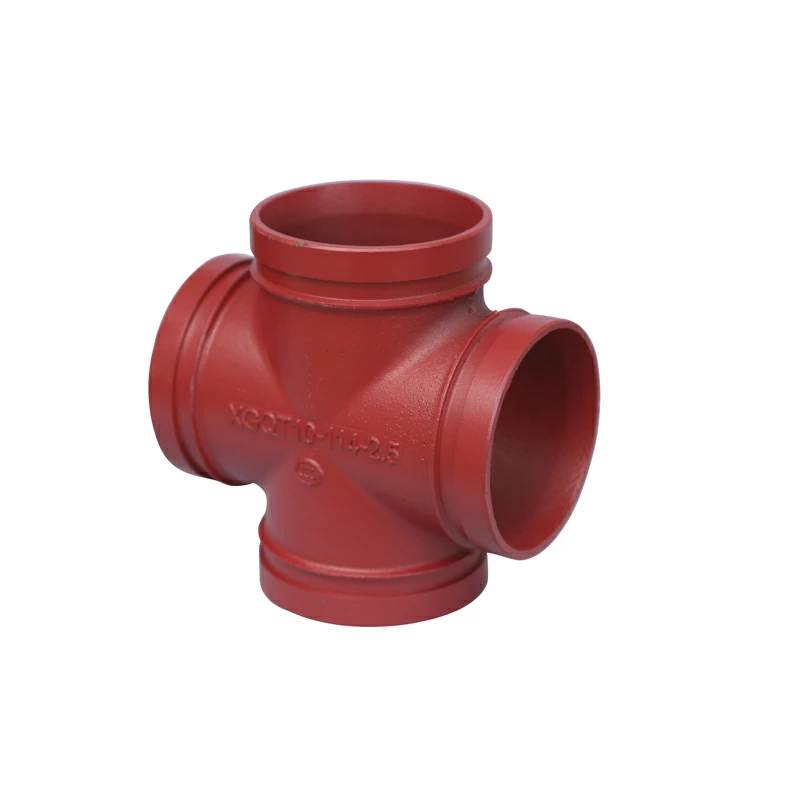Ductile Iron Grooved Equal Cross fittings are designed to withstand various external environmental factors and stress within a pipeline system through several design and material considerations:
- Material Durability: Ductile iron, known for its high strength and ductility, is used in these fittings. This material choice ensures resistance to wear, corrosion, and environmental degradation, enhancing longevity in various conditions.
- Corrosion Resistance: Manufacturers often apply protective coatings or linings to the ductile iron to prevent corrosion caused by exposure to different fluids, gases, or atmospheric conditions. These coatings, such as epoxy coatings or zinc coatings, act as a barrier against corrosion.
- Sealing Mechanism: The grooved design of these fittings, combined with flexible gaskets, provides a reliable and secure seal. This helps prevent leakage, even under stress or pressure within the pipeline.
- Robust Construction: Ductile Iron Grooved Equal Cross fittings are engineered to withstand internal pressure, external forces, and mechanical stress. Their robust construction ensures they can endure the forces exerted on them within the pipeline system.
- Temperature Resistance: These fittings are designed to handle a wide range of temperatures without losing their structural integrity or performance. They can accommodate thermal expansion and contraction without compromising the pipeline’s integrity.
- Compliance with Standards: Manufacturers ensure that Ductile Iron Grooved Equal Cross fittings adhere to industry standards and undergo rigorous testing to verify their ability to withstand environmental factors, pressure, and stress.
- Flexible Design for Movement: The grooved coupling system allows for a certain degree of movement and flexibility within the pipeline, helping to absorb stresses caused by external factors like ground movement or vibrations.
- Proper Installation: Following manufacturer guidelines for installation, including proper alignment and torque specifications for bolts or clamps, ensures that the fittings are optimally placed and secured, enhancing their ability to withstand stress.
These design features and material considerations collectively enable Ductile Iron Grooved Equal Cross fittings to withstand external environmental factors, pressure, and stress within a pipeline system, ensuring their reliability and longevity. Regular inspections and adherence to maintenance practices further contribute to their continued functionality in diverse conditions.
Can you discuss any specialized coatings or treatments used on these fittings to enhance their durability or resistance to corrosion?
Certainly! Ductile Iron Grooved Equal Cross fittings often undergo specialized coatings or treatments aimed at enhancing their durability and corrosion resistance. Ductile Iron Grooved Equal Cross These coatings and treatments are designed to protect the fittings from environmental factors and extend their lifespan.
Some of the common methods include:
- Epoxy Coatings: Epoxy coatings are applied to the surface of the fittings to create a protective barrier against corrosion. Epoxy coatings provide excellent resistance to chemicals, moisture, and abrasion, safeguarding the fittings from various harsh substances present in pipelines.
- Zinc Coatings: Zinc coatings, such as hot-dip galvanization or zinc electroplating, are used to provide a sacrificial layer that corrodes instead of the underlying iron, effectively protecting the fittings from rust and corrosion.
- Polymer Coatings: Polymer coatings, like polyethylene or polypropylene, offer a resilient protective layer that shields the fittings from chemical exposure, abrasion, and environmental elements. These coatings are known for their durability and resistance to impact.
- Fusion-Bonded Epoxy (FBE): FBE coatings are thermosetting coatings applied through a fusion process, creating a strong and corrosion-resistant layer on the surface of the fittings. FBE coatings are highly resistant to chemicals and provide excellent adhesion to the metal surface.
- Cathodic Protection: In some cases, fittings are treated with cathodic protection systems, such as sacrificial anodes or impressed current systems. These methods use electrical currents to protect the fittings from corrosion, particularly in environments prone to aggressive corrosion.
- Powder Coatings: Powder coatings are applied electrostatically and cured under heat, forming a hard, durable finish on the fittings. These coatings offer excellent resistance to impact, chemicals, and environmental factors.
- Phosphate Treatments: Phosphate treatments are used as a pre-treatment process to enhance the adhesion of subsequent coatings or paints, providing an additional layer of protection against corrosion.
These specialized coatings and treatments not only improve the corrosion resistance of Ductile Iron Grooved Equal Cross fittings but also enhance their durability and ability to withstand harsh environmental conditions, extending their service life within various pipeline systems. The choice of coating or treatment often depends on the specific requirements of the application and the environment in which the fittings will be installed.
